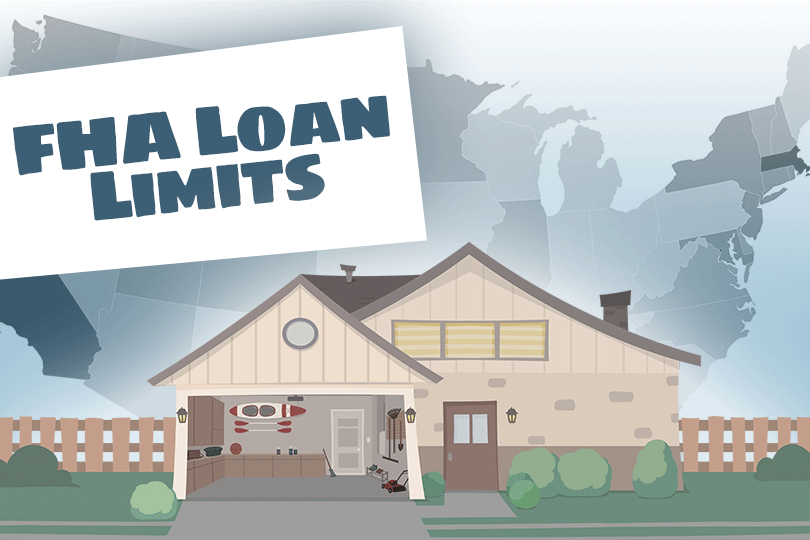Important Things to Know About FHA Lending Limits
September 17, 2022
Why Does the FHA Set Limits?
The reason for setting lending limits is straightforward; by placing a limit on how much an FHA lender loans to a borrower, they can manage the risk of the borrower defaulting on the loan.
The FHA’s goal is to help more families gain access to affordable housing. By backing approved lenders and allowing them to grant mortgages to low and moderate-income borrowers, the FHA is granting more homebuying opportunities where there were none previously. To continue growing the housing market, the FHA determines what it can afford to insure, and sets limits that borrowers must follow.
How Are FHA Limits Set?
FHA lending limits are updated annually and are determined according to the location of the home and property type, using a percentage of the national conforming loan limit, set by the Federal Housing Finance Agency (FHFA).
The FHA determines high-cost areas of the country based on income levels, construction costs, and housing demand. Heavily populated metropolitan areas have higher median home prices, which is why the FHA sets the limit at the higher end, also known as the “ceiling.” That ceiling is set at 150% of the national conforming loan limit. For counties with lower construction costs and income levels, the FHA sets a lower limit known as the “floor.” This limit is set at 65% of the conforming loan amount.
There are some counties in the U.S. that fall between the floor and ceiling. For these areas, the limit is equal to 115% of the median sale price of a home in the area. For example, if the median sale price in a particular market is $500,000, the loan limit would be (115% of $500,000) $575,000.
The FHA’s limits also vary based on property type. It insures loans to buy a duplex, triplex, or four-unit property if the borrower continues to live in one of the units. Taking this into account, there are separate FHA limits for all property types in every county.
What If I Exceed FHA Loan Limits?
Oftentimes, borrowers may find a home that they fall in love with, but one that costs more than the FHA will insure. In such cases, there are still options to stick with an FHA loan. If you can put down more than the minimum 3.5% on the house, you can buy a pricier home with the same FHA loan limit.
You also have the option of financing with an FHA Jumbo Loan, mortgages that exceed the FHA's county limit for home loans in each zip code. Since jumbo loans come with greater risk to the lender, the FHA has more stringent eligibility requirements for borrowers. The minimum credit score required to apply for an FHA Jumbo Loan is 600 instead of 580, and 640 for refinances.
The FHA also forbids applicants from using any assistance or gift funds for the 3.5% down payment, to ensure that borrowers have the finances to afford the large loan. An FHA Jumbo Loan might require two separate appraisals if the market is declining or the borrower is making a down payment of 5% or less. Borrowers should also note that FHA jumbo loans typically have higher interest rates than conventional jumbo loans.
If you are getting ready to purchase a home with an FHA loan, it is important to know just how much you can borrow. Visit our FHA Loan Limits page to find out the maximum loan amount in your county.

FHA Loan Articles
December 10, 2024The FHA announced increased loan limits for 2025, providing those seeking FHA-insured mortgages after January 1st with increased purchasing power. In this article, we explore the key aspects of these limits and their implications for your homeownership goals.
When you are approved for an FHA-insured loan, the FHA guarantees a portion of the loan to the lender, lowering lender risk...
December 9, 2024The Federal Housing Administration (FHA) helps people buy homes, especially those buying for the first time or who might not have perfect credit. In 2025, there is good news for FHA borrowers. FHA home loan limits are going up.
In most places, the FHA loan limit for a single-family home in 2025 is $524,225. This is more than it was in 2024. However, in expensive areas, where houses cost more, the limit can be as high as $1,209,750.
December 5, 2024The Federal Housing Administration (FHA) has some ground rules regarding cash-out refinances. These rules are designed to protect both you and the lender, ensuring you have enough ownership of your home and reducing the risk of foreclosure. How long must you own your home before you can apply for FHA cash-out refinancing?
December 4, 2024When you think about owning a farm, do you dream of vast landscapes and thriving agricultural enterprises? Or are you looking for a quaint farm-style house to live in but not necessarily to start a new farming career?
Borrowers who want to buy a farm residence are in luck with the FHA loan program, which includes options to purchase farm residences.
November 27, 2024If you are new to the home loan process, you may wonder how your loan officer will interpret your application data. How lenient is the lender with issues related to debt, credit utilization, and related factors? We examine some key points, but remember that what follows is not financial advice. Always consult a finance or tax professional for the most current information.







